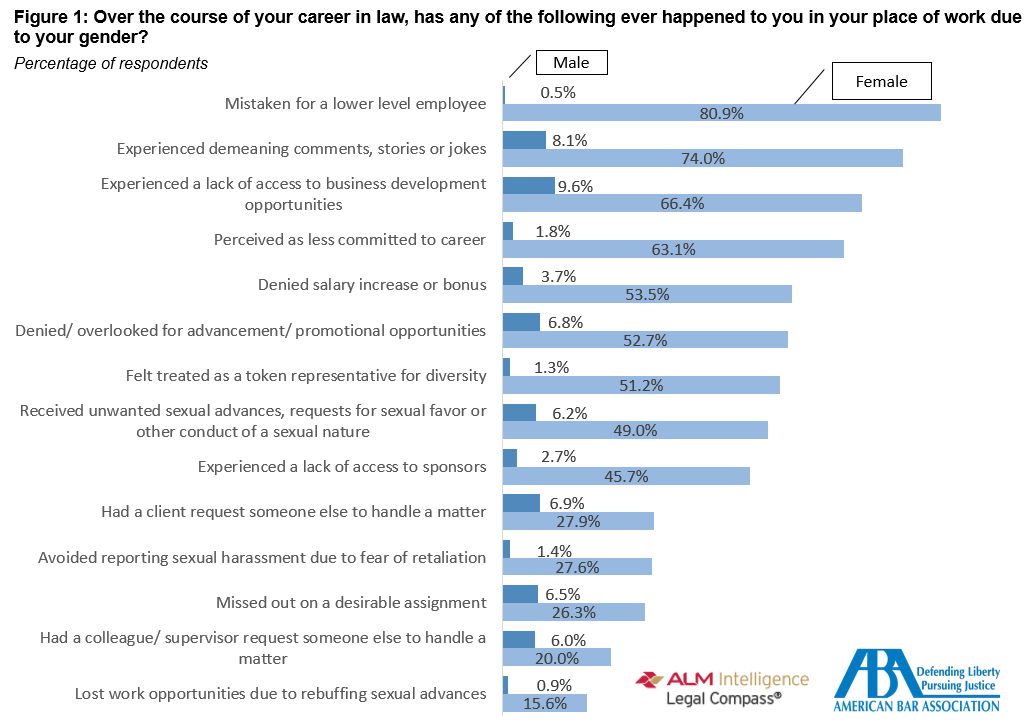Women Describe Their Experience Working in Big Law, And It's Not Pretty
The class actions at Jones Day are the tip of the iceberg. Women say change is needed.
April 18, 2019 at 08:15 AM
7 minute read
Earlier this month it was revealed that six women are in the process of suing Jones Day over accusations of alleged gender discrimination (to catch up see here and here). The timing of the lawsuits coincides with the end of a yearlong research partnership between the American Bar Association and ALM Intelligence which looked into the experience of women working inside Big Law. Depressingly, the findings from the research project and the details of the lawsuits have much in common.
The lawsuits against Jones Day include detail on a list of alarming behavior including gender stereotyping during pay and promotion decisions and name-calling. In one instance a male summer associate received applause and high-fives after pushing a female summer associate into a pool at an event hosted at a partner's private home. The lawsuit also describes a female's maternity leave experience. Upon returning from her first maternity leave she was subjected to a salary freeze and negative reviews. After her second maternity leave, she was told to look for another job. Another suit filed last year claims the firm's compensation and performance review systems purposely discriminate against females.
In Their Own Words: Women's Experience in Big Law
The details shared in both of these suits—repercussions when returning from maternity leave, sexual harassment, verbal abuse, unfair review and compensation processes and denied opportunities—unfortunately, are not one-off.
These lawsuits against Jones Day have brought to the forefront a topic that ALM Intelligence and the ABA recently partnered on: women's experience working in Big Law. Over the course of 2018, the ABA and ALM Intelligence partnered on a research project to better understand the different experiences that women with 15 or more years of legal experience have versus their male counterparts. In addition to collecting data, female attorneys shared, in their own words, their first-hand experience working in Big Law. These comments provide a snapshot of what many females experience during their legal careers:
“To this day, I am mistaken for being the court reporter, paralegal, secretary, etc. I have had judges call me sweetie in open court.”
“The day I made partner (we had one tier at the time), one of my male partners came to my office to congratulate me. He closed the door and planted a big wet kiss on my lips and said 'I have been waiting for years to do that….now you can't sue me.'”
It's bad enough that these experiences happened and continue to happen. What makes it all the more disturbing is much goes unreported for fear of retaliation:
“A client became very touchy and hands-on. I had just arrived at the firm and did not feel I could report it without it becoming an issue and me being labeled as “that troublemaker” and ultimately losing my job.”
And, this fear is warranted, not an illusion:
“As a young associate, my direct supervising attorney made numerous advances, inappropriate comments, etc. I did not report anything for fear of retaliation until my exit interview. And then the retaliation was massive. He wrote all sorts of BS crap to HR saying that in my final week or two that I had been insubordinate, that I had left tasks undone, that I was “refusing” to do certain things, that I was “abandoning” projects and causing client harm, etc.”
“I had male partners when I was an associate grope me in the office and at firm events after they had been drinking and told not to be upset… in fact a shareholder told me I should be flattered and if I was “more appreciative” of the attention and that he and others were the shareholders who would one day vote on my partnership. When asked out the male partner said I did not work for him specifically/not assigned so it's ok… I told him I did not date those I work with and I was engaged. He said to relax – kissed me and groped me and when I did report this the firm said they would transfer me to another office or I could live with it.”
While this is deeply troubling, it's worth noting that there are firms responding accordingly and take action to improve the situation:
“A potential client wanted to be more than a potential client. He was the potential client of a senior partner that I did not know well. I was not sure what would happen when I declined the invitation to Mexico but my senior partner gave the appropriate response – we do not want clients like that and do not behave in that manner.”
“Advances in an office party setting from someone who had had too much to drink. I told him off and when he persisted, I simply left the event. When I heard that after I had left, the person had turned his attention on a young associate in his group, I reported him to senior management. He was met by senior management and told that his behavior was inappropriate and banned from parties.”
These comments aren't one-off, the ABA-ALM Intelligence research project collected over 200 quotes like the ones featured above. The majority of the quotes collected described multiple incidents per individual. Beyond these comments, detailing individual offenses, are many women who declined the opportunity to describe a single event and, instead, wrote: “there are too many incidents to recall.” Such a response isn't a dismissal of the offenses these women experienced. It is a recognition that no single event can adequately summarize years of demeaning comments or inappropriate actions. The fact that so many women, unprompted wrote “there are too many incidents to recall” is a powerful reminder that the quotes above are a snapshot of the daily abuses that many women experience within Big Law.
In total, more than 900 female attorneys with more than 15 years of experience in the legal industry responded to the ABA-ALM Intelligence survey. The data confirms that the experiences women provided, in their own words, is an accurate portrayal of the life inside Big Law for women. Four out of every five (80.9%) female attorneys with more than 15 years of experience reported that they have been mistaken for a lower level employee. Three fourths (74%) said they have experienced demeaning comments, 66% have had a lack of access to business development opportunities and 63% have been perceived as less committed to their career.
The list of offenses experienced female attorneys have endured over the course of their careers goes on (see Figure 1 above). Women are more likely than their male counterparts to be denied salary increases or overlooked for advancement. They are also more likely to be used as token representatives at client meetings or public events. They are more likely to receive unwanted sexual advances and less likely to report them due to fear of retaliation. A notable concern for the future of the legal industry, women report that they have less access to sponsors and are more likely to miss out on opportunities due to clients or colleagues asking for “someone else” to be staffed on an engagement.
The data and individual accounts collected through this research project all point toward the same conclusion. The difference in experience between female and male attorneys is astounding. This needs to change.
This content has been archived. It is available through our partners, LexisNexis® and Bloomberg Law.
To view this content, please continue to their sites.
Not a Lexis Subscriber?
Subscribe Now
Not a Bloomberg Law Subscriber?
Subscribe Now
NOT FOR REPRINT
© 2025 ALM Global, LLC, All Rights Reserved. Request academic re-use from www.copyright.com. All other uses, submit a request to [email protected]. For more information visit Asset & Logo Licensing.
You Might Like
View All

'That's Disappointing': Only 11% of MDL Appointments Went to Attorneys of Color in 2023
7 minute read

Confusion Over New SEC Cyber Rules Leading Firms to Overstate Attack Readiness
Trending Stories
- 1Uber Files RICO Suit Against Plaintiff-Side Firms Alleging Fraudulent Injury Claims
- 2The Law Firm Disrupted: Scrutinizing the Elephant More Than the Mouse
- 3Inherent Diminished Value Damages Unavailable to 3rd-Party Claimants, Court Says
- 4Pa. Defense Firm Sued by Client Over Ex-Eagles Player's $43.5M Med Mal Win
- 5Losses Mount at Morris Manning, but Departing Ex-Chair Stays Bullish About His Old Firm's Future
Who Got The Work
J. Brugh Lower of Gibbons has entered an appearance for industrial equipment supplier Devco Corporation in a pending trademark infringement lawsuit. The suit, accusing the defendant of selling knock-off Graco products, was filed Dec. 18 in New Jersey District Court by Rivkin Radler on behalf of Graco Inc. and Graco Minnesota. The case, assigned to U.S. District Judge Zahid N. Quraishi, is 3:24-cv-11294, Graco Inc. et al v. Devco Corporation.
Who Got The Work
Rebecca Maller-Stein and Kent A. Yalowitz of Arnold & Porter Kaye Scholer have entered their appearances for Hanaco Venture Capital and its executives, Lior Prosor and David Frankel, in a pending securities lawsuit. The action, filed on Dec. 24 in New York Southern District Court by Zell, Aron & Co. on behalf of Goldeneye Advisors, accuses the defendants of negligently and fraudulently managing the plaintiff's $1 million investment. The case, assigned to U.S. District Judge Vernon S. Broderick, is 1:24-cv-09918, Goldeneye Advisors, LLC v. Hanaco Venture Capital, Ltd. et al.
Who Got The Work
Attorneys from A&O Shearman has stepped in as defense counsel for Toronto-Dominion Bank and other defendants in a pending securities class action. The suit, filed Dec. 11 in New York Southern District Court by Bleichmar Fonti & Auld, accuses the defendants of concealing the bank's 'pervasive' deficiencies in regards to its compliance with the Bank Secrecy Act and the quality of its anti-money laundering controls. The case, assigned to U.S. District Judge Arun Subramanian, is 1:24-cv-09445, Gonzalez v. The Toronto-Dominion Bank et al.
Who Got The Work
Crown Castle International, a Pennsylvania company providing shared communications infrastructure, has turned to Luke D. Wolf of Gordon Rees Scully Mansukhani to fend off a pending breach-of-contract lawsuit. The court action, filed Nov. 25 in Michigan Eastern District Court by Hooper Hathaway PC on behalf of The Town Residences LLC, accuses Crown Castle of failing to transfer approximately $30,000 in utility payments from T-Mobile in breach of a roof-top lease and assignment agreement. The case, assigned to U.S. District Judge Susan K. Declercq, is 2:24-cv-13131, The Town Residences LLC v. T-Mobile US, Inc. et al.
Who Got The Work
Wilfred P. Coronato and Daniel M. Schwartz of McCarter & English have stepped in as defense counsel to Electrolux Home Products Inc. in a pending product liability lawsuit. The court action, filed Nov. 26 in New York Eastern District Court by Poulos Lopiccolo PC and Nagel Rice LLP on behalf of David Stern, alleges that the defendant's refrigerators’ drawers and shelving repeatedly break and fall apart within months after purchase. The case, assigned to U.S. District Judge Joan M. Azrack, is 2:24-cv-08204, Stern v. Electrolux Home Products, Inc.
Featured Firms
Law Offices of Gary Martin Hays & Associates, P.C.
(470) 294-1674
Law Offices of Mark E. Salomone
(857) 444-6468
Smith & Hassler
(713) 739-1250









